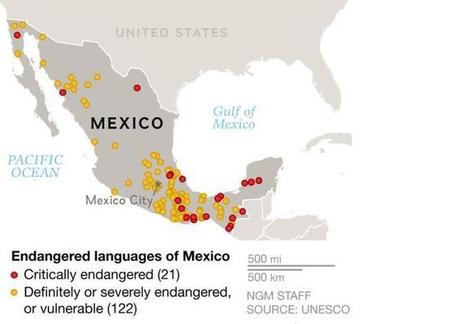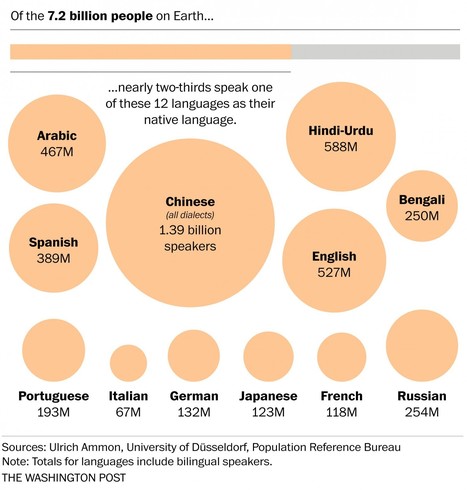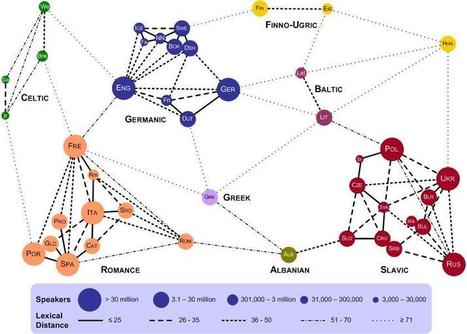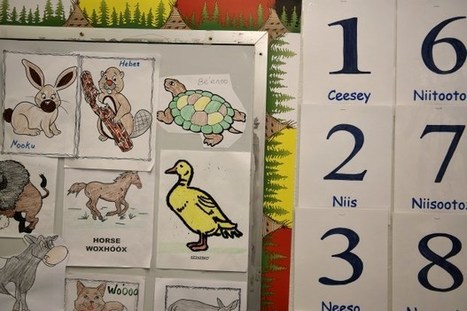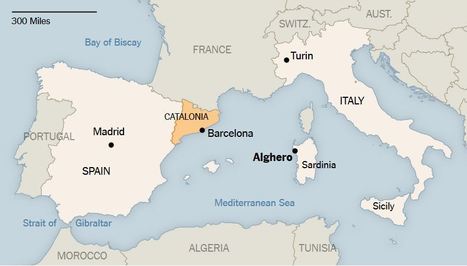
|
Rescooped by Dennis Swender from iGeneration - 21st Century Education (Pedagogy & Digital Innovation) |
Get Started for FREE
Sign up with Facebook Sign up with X
I don't have a Facebook or a X account

 Your new post is loading... Your new post is loading...
 Your new post is loading... Your new post is loading...
No comment yet.
Sign up to comment

Richard Aitchison's curator insight,
February 6, 2018 9:03 AM
The link between language and national identity is important as shown in this article as Europeans believe it is the the number one link and most important. From an American standpoint this was interesting to read as the trend nowadays, especially in America is to be more open to multiple languages and always viewing Europe as a place where many of the people that would live their would speak multiple languages as well. How we communicate with people is very important obviously and now it has even become a political issue. If you tend to lend more left you link national identity and language less and if you lean more right you tend to link national identity and language more. This is something that will continue to play out in the United States over the next decade as the Hispanic community continues to grow in the country and language will come to the forefront. While America has always been a melting pot of people, English has always survived as its dominate language and a way to identify Americans. Twenty or Thirty years from now will that continue? Will Americans lose that as and Identity, how will that effect them? Will this become a major political battle as well, how will this play out in elections in 2020, 2024, 2028, and beyond. Some very interesting trends to look at.
Douglas Vance's curator insight,
February 9, 2018 3:37 PM
For most of Europe, but especially older and more conservative Europeans, being able to speak the language of the country you live in is incredibly closely tied to national identity. Therefore, immigrants who arrive and do not speak the language are viewed as "others" and not belonging. This close tie between language and national identity serves as one of the fuels for anti-immigrant sentiments in many European nations. Although this sentiment is not confined to just Europe.

Zavier Lineberger's curator insight,
March 9, 2018 2:26 PM
(Europe) Throughout Europe and North America, the majority of citizens believe the national language is essential to the country's identity. For immigrants to be considered a part of these countries, the majority believe proficiency is required. In the United States, age, education, and religion are all factors contributing to this view, however race has little effect on people's view of language. Like America, older and more conservative Europeans place a higher emphasis on language. National identity can be a geopolitical problem for the European Union because some countries believe the 24 official languages subvert autonomy and internal unity. Interestingly Canada, a country with two official languages, places a lessor importance on language, with only a 59% majority believing it is fundamental to identity.

Richard Aitchison's curator insight,
March 9, 2018 10:05 AM
The study of language in a population is always fascinating. In this instance this one is very fascinating especially for someone that is in English speaker from America. While most of the world that we know it speaks some kind of English or tries to bend to using English for business terms or what not it was quite the headline to see this. In Cameroon they have both French and English speakers, however French speakers heavily outweigh English speakers. 8 of the 10 counties in the country are French dominated, however they are trying to takeover the English speaking areas as well. The hostility has been built up as teachers claim that many of their jobs are now going to French speakers in the schools and other are arguing that there should be English speakings judges in English speaking areas. It is so strange to see a backlash versus the English language in this country and also to see such a heavy division. Maybe its because we live in a world in which we believe the English world dominates, but seeing people discriminated against for speaking English comes shocking and maybe can open our eyes and view what we are doing in this country or in other parts of the world. We read this article and believe that something needs to be done, but what do we do in this country or other parts of the world to help other people that speak different languages? Do we have Spanish speaking teachers in heavy Spanish areas? In cities that have a high Haitian population do we hire teachers and judges that speak Creole? Pieces like this should help us reflect on our own situation and always reflect on how the population of areas can eventually effect the social and cultural issues.
Katie Kershaw's curator insight,
March 31, 2018 4:05 PM
This is a good example of the long term affects of colonialism even after independence. Teachers in English speaking sections of Cameroon complained as more French speaking teachers began taking jobs in their regions. The English speakers complained because the curriculum the French speakers were teaching is different. Lawyers in the English speaking regions also raised the issue that the judges and other government officials were only speaking French, making their jobs difficult to do. What’s more interesting is that the constitution of the country recognizes both English and French as official languages. But since a majority of citizens speak French, those that speak English feel alienated and like they are being treated as second-class citizens. The federal government also operates almost exclusively in French. The long term build up of this tension has caused those in the English speaking regions to revolt, unfortunately they did it violently. The opposition party in the country has taken advantage of this in order to help their party by claiming that they will help incite change if voted into office. The party in power spun the situation to say that those revolting were being paid by foreign powers. The effects of colonialism can be devastating and harm people long after colonizers leave. This is a country where there are two official languages, yet the majority has been able to gang up on the minority. It’s unfortunate because people cannot be happy in their own jobs or daily lives and the government and their fellow citizens are ignoring them.
brielle blais's curator insight,
May 1, 2018 10:04 PM
A nation's language is incredibly important to it's geography. In Cameroon, there are mostly French speaking citizens, however, there are still many English speakers.The differences are seen as more French speakers are getting jobs than English. They see this as discrimination. A huge problem is also dealing with important jobs such as in the courtroom. People who cannot understand each other cannot decide on things together. Things like this cause a lot of conflict in countries.
L.Long's curator insight,
March 24, 2016 6:57 PM
These two languages are not in the same language family yet there are many similiarities (article with more connections that in the video). I would like to challenge you educators to not just say to your students "these similarities are neat!" Make the geographic connections to explain the 'why' behind this cultural pattern and the implications of it.
Questions to Ponder: What past political factors led to this cultural convergence? How were global regions different in the past? What are the were the impacts of this convergence, both in the past and lingering results today?
Tags: diffusion, language, toponyms, culture, colonialism, regions.
Jeremy Hansen's curator insight,
March 28, 2016 10:55 AM
These two languages are not in the same language family yet there are many similiarities (article with more connections that in the video). I would like to challenge you educators to not just say to your students "these similarities are neat!" Make the geographic connections to explain the 'why' behind this cultural pattern and the implications of it.
Questions to Ponder: What past political factors led to this cultural convergence? How were global regions different in the past? What are the were the impacts of this convergence, both in the past and lingering results today?
Tags: diffusion, language, toponyms, culture, colonialism, regions. 
MsPerry's curator insight,
March 31, 2016 12:56 PM
These two languages are not in the same language family yet there are many similiarities (article with more connections that in the video). I would like to challenge you educators to not just say to your students "these similarities are neat!" Make the geographic connections to explain the 'why' behind this cultural pattern and the implications of it.
Questions to Ponder: What past political factors led to this cultural convergence? How were global regions different in the past? What are the were the impacts of this convergence, both in the past and lingering results today?
Tags: diffusion, language, toponyms, culture, colonialism, regions.
Mark Hathaway's curator insight,
September 22, 2015 8:29 AM
The demise of a language is a truly tragic event. I am heartened to see that there are efforts being undertaken to preserve these historic languages. New technologies will hopefully aid us in this effort. I imagine that the United States probably faces similar issues when it comes to language loss. We should coordinate some sort of national policy in how to deal with the issue. The current state of political affairs will probably hamper the cause, but it is still worth a shot. I am in full support of all efforts that might preserve these classic languages.
Gene Gagne's curator insight,
December 2, 2015 9:29 AM
This is one of the reasons that when immigrants come into this country its important they keep their native language going as well as learning to speak English. The sharing of culture, and language is indeed very important. Lots of people come to America and are told to speak English and eventually they lose their native language as well as culture. The English speaking only citizens of this country lose out on a good education about someone's native country. Its too bad. Just think music, language, food, values etc...there is a lot to learn.
Genesis Orellana Cabrera's curator insight,
January 24, 2018 10:45 PM
Languages are greatly important which is why I see the urgency in wanting to keep those endangered languages alive. Globalization through this article shows to be affecting cultural geography as Mexicans no longer see the need to know any other language but Spanish since it domains. This is causing the culture of Mexico to be forgotten. Just like Harrison said, "Each of the Mexican indigenous languages contains millennia of human experience, wisdom, and practical knowledge about the natural environment." The many languages are one of the things that shape Mexico and its people.

Caitlyn Christiansen's curator insight,
May 26, 2015 10:35 AM
The world is extremely diverse in its spread of native languages. Yet only a handful are commonly spoken by the majority of the world, about 2/3. Over half of the world's languages are expected to go extinct because of the extreme diversity and the minimal distribution which means that in some places almost every person speaks a completely different language and many are dying as their last speakers do not pass it on to their children.
This article is relates to cultural patterns and processes through the geographic spread of languages around the globe and the increasing acculturation that causes the loss of many of these languages in our increasingly globalized world. 
Michael Amberg's curator insight,
May 26, 2015 10:35 PM
Its interesting to see just how many people speak the languages we speak everyday, and to see just how many people DONT speak it.
Shane C Cook's curator insight,
May 27, 2015 5:34 AM
It is amazing to see all main languages in perspective to the world. Mandarine holding the top spot with 1.39 Billion surprises me but at the same time doesn't. There are 1.3 billion people living there in the first place.

Kristin Mandsager San Bento's curator insight,
April 6, 2015 9:29 PM
This made me think of how this could be done in New York City. I imagine results would be similar. You could map out the languages for sure.
ethanrobert's curator insight,
March 19, 2014 10:20 AM
This is a wonderful map that truly shows language families and their roots. In Europe, I was rather surprised when I seen that the Romance branch was much larger than that of the Germanic. All of the ancient Germanic groups such as the Jutes, Angols, and the Saxons were well versed in combat. Considering they conquered much of Western Europe, how is it that the Romance group is bigger than the Germanic? Also, in Eastern Europe, the Albanian language has no reason to exist. In a region dominated by the Slavic group with no environmental barriers, the Albanian language should not exist.~Ethan. 
Ness Crouch's curator insight,
March 28, 2014 8:43 PM
This isn't my normal area of interest but I found this fascinating! |

Richard Aitchison's curator insight,
February 6, 2018 9:03 AM
The link between language and national identity is important as shown in this article as Europeans believe it is the the number one link and most important. From an American standpoint this was interesting to read as the trend nowadays, especially in America is to be more open to multiple languages and always viewing Europe as a place where many of the people that would live their would speak multiple languages as well. How we communicate with people is very important obviously and now it has even become a political issue. If you tend to lend more left you link national identity and language less and if you lean more right you tend to link national identity and language more. This is something that will continue to play out in the United States over the next decade as the Hispanic community continues to grow in the country and language will come to the forefront. While America has always been a melting pot of people, English has always survived as its dominate language and a way to identify Americans. Twenty or Thirty years from now will that continue? Will Americans lose that as and Identity, how will that effect them? Will this become a major political battle as well, how will this play out in elections in 2020, 2024, 2028, and beyond. Some very interesting trends to look at.
Douglas Vance's curator insight,
February 9, 2018 3:37 PM
For most of Europe, but especially older and more conservative Europeans, being able to speak the language of the country you live in is incredibly closely tied to national identity. Therefore, immigrants who arrive and do not speak the language are viewed as "others" and not belonging. This close tie between language and national identity serves as one of the fuels for anti-immigrant sentiments in many European nations. Although this sentiment is not confined to just Europe.

Zavier Lineberger's curator insight,
March 9, 2018 2:26 PM
(Europe) Throughout Europe and North America, the majority of citizens believe the national language is essential to the country's identity. For immigrants to be considered a part of these countries, the majority believe proficiency is required. In the United States, age, education, and religion are all factors contributing to this view, however race has little effect on people's view of language. Like America, older and more conservative Europeans place a higher emphasis on language. National identity can be a geopolitical problem for the European Union because some countries believe the 24 official languages subvert autonomy and internal unity. Interestingly Canada, a country with two official languages, places a lessor importance on language, with only a 59% majority believing it is fundamental to identity.

Tom Cockburn's curator insight,
December 13, 2016 3:52 AM
7 activists arrested by Spanish police for insulting king felipe
Katie Kershaw's curator insight,
February 17, 2018 3:35 PM
Prior to Catalon’s attempt to gain independence from Spain last year, I was unaware that there was a region of Spain that was so culturally not Spanish. This article then introduced me to the Catalonian people living in Italy. In Italy, the Catalon culture is not even close to as widespread and important as it is in Spain. The language is scarcely used in the one region (Alghero) where it was most prevalent a century ago— in fact only about 25% of people here speak Catalon as their primary language. The article explains that the Catalon culture is dying off in Alghero, unlike in Spain where people are so passionate that they want independence. One of the biggest reasons the article atributes this to is the fact that Italy’s government has not been oppressive of Alghero’s population. There are signs, menus, and people who have spoken the language with no government opposition, so people do not feel the need to protect the culture. On the contrary, the Spanish government strongly pushes Spanish culture onto the Catalonians, which is why they fight for independence. Catalonians feel threatened in Spain and try to defend, whereas in Italy the Catalonians don’t feel threatened and don’t have a reason to cling so strongly to their culture. Younger people in Alghero speak almost exclusively Italian and education in Catalon is very rare. This is interesting to me, because unlike the physical connection that Catalonia has with the rest of Spain, Alghero is quite distanced from the rest of Italy.
The distance seems like it would make it easier for Alghero’s residents to maintain their Catalonian roots, but the opposite is happening. The article touches on this a bit, as it explains that since Alghero is on Sardinia, Sardinian is the most common ethnic group. Sardinian culture and language is more prevalent in the area and Catalonians simply don’t have the numbers to compete. Another explanation for this is the highly centralized way in which Italian education is set up. Schoolchildren’s education is uniform with the education that the rest of Italy and has a much stronger Italian influence than proud Catalonians would like. The final thought I had after reading this article was a question: If Catalonia somehow gained independence from Spain would they attempt to obtain Sardinia as part of their nation in order to take control of their fellow Catalonians?
Nicole Canova's curator insight,
March 23, 2018 4:24 PM
The Mediterranean region is a good example of the fact that borders do not always indicate identity, a concept I looked at in a few articles on North America. Due to trade relationships that date back thousands of years, cultures were dispersed and blended throughout the Mediterranean. This has led to some interesting things, such as Catalan being spoken in Alghero, on the Italian island of Sardinia.

Richard Aitchison's curator insight,
March 9, 2018 10:05 AM
The study of language in a population is always fascinating. In this instance this one is very fascinating especially for someone that is in English speaker from America. While most of the world that we know it speaks some kind of English or tries to bend to using English for business terms or what not it was quite the headline to see this. In Cameroon they have both French and English speakers, however French speakers heavily outweigh English speakers. 8 of the 10 counties in the country are French dominated, however they are trying to takeover the English speaking areas as well. The hostility has been built up as teachers claim that many of their jobs are now going to French speakers in the schools and other are arguing that there should be English speakings judges in English speaking areas. It is so strange to see a backlash versus the English language in this country and also to see such a heavy division. Maybe its because we live in a world in which we believe the English world dominates, but seeing people discriminated against for speaking English comes shocking and maybe can open our eyes and view what we are doing in this country or in other parts of the world. We read this article and believe that something needs to be done, but what do we do in this country or other parts of the world to help other people that speak different languages? Do we have Spanish speaking teachers in heavy Spanish areas? In cities that have a high Haitian population do we hire teachers and judges that speak Creole? Pieces like this should help us reflect on our own situation and always reflect on how the population of areas can eventually effect the social and cultural issues.
Katie Kershaw's curator insight,
March 31, 2018 4:05 PM
This is a good example of the long term affects of colonialism even after independence. Teachers in English speaking sections of Cameroon complained as more French speaking teachers began taking jobs in their regions. The English speakers complained because the curriculum the French speakers were teaching is different. Lawyers in the English speaking regions also raised the issue that the judges and other government officials were only speaking French, making their jobs difficult to do. What’s more interesting is that the constitution of the country recognizes both English and French as official languages. But since a majority of citizens speak French, those that speak English feel alienated and like they are being treated as second-class citizens. The federal government also operates almost exclusively in French. The long term build up of this tension has caused those in the English speaking regions to revolt, unfortunately they did it violently. The opposition party in the country has taken advantage of this in order to help their party by claiming that they will help incite change if voted into office. The party in power spun the situation to say that those revolting were being paid by foreign powers. The effects of colonialism can be devastating and harm people long after colonizers leave. This is a country where there are two official languages, yet the majority has been able to gang up on the minority. It’s unfortunate because people cannot be happy in their own jobs or daily lives and the government and their fellow citizens are ignoring them.
brielle blais's curator insight,
May 1, 2018 10:04 PM
A nation's language is incredibly important to it's geography. In Cameroon, there are mostly French speaking citizens, however, there are still many English speakers.The differences are seen as more French speakers are getting jobs than English. They see this as discrimination. A huge problem is also dealing with important jobs such as in the courtroom. People who cannot understand each other cannot decide on things together. Things like this cause a lot of conflict in countries.

Fred Issa's curator insight,
October 5, 2015 4:14 PM
I found this article most interesting, having lived in RI, NJ, GA, IN, MD, and TX. After awhile, you will start to pick up certain words, while dropping other similar words that I have used all of my life. The words and phrases both tend to change from one state to another. Read the article, it is enlightening. Fred Issa,

Caitlyn Christiansen's curator insight,
May 26, 2015 10:35 AM
The world is extremely diverse in its spread of native languages. Yet only a handful are commonly spoken by the majority of the world, about 2/3. Over half of the world's languages are expected to go extinct because of the extreme diversity and the minimal distribution which means that in some places almost every person speaks a completely different language and many are dying as their last speakers do not pass it on to their children.
This article is relates to cultural patterns and processes through the geographic spread of languages around the globe and the increasing acculturation that causes the loss of many of these languages in our increasingly globalized world. 
Michael Amberg's curator insight,
May 26, 2015 10:35 PM
Its interesting to see just how many people speak the languages we speak everyday, and to see just how many people DONT speak it.
Shane C Cook's curator insight,
May 27, 2015 5:34 AM
It is amazing to see all main languages in perspective to the world. Mandarine holding the top spot with 1.39 Billion surprises me but at the same time doesn't. There are 1.3 billion people living there in the first place.

Kristen McDaniel's curator insight,
May 2, 2014 3:10 PM
Very interesting look at how language changes over time. Examples: landline, "friend IRL", and vinyl. |









